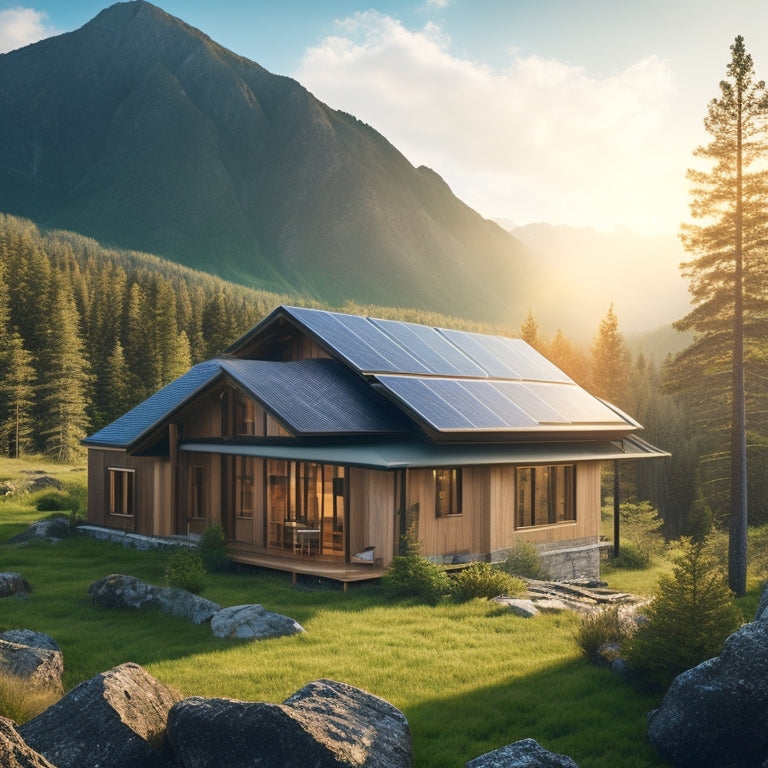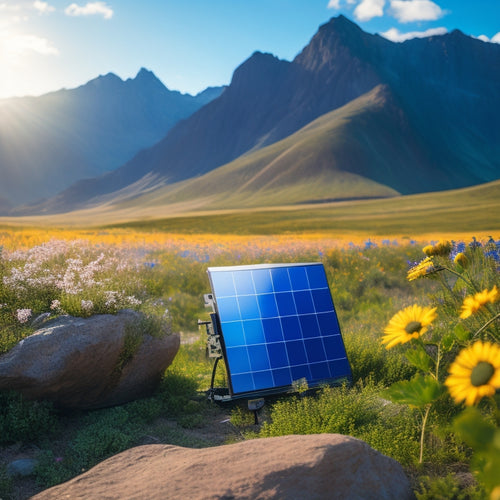
5 Best Off-Grid Solar Power Systems for Remote Areas
Share
You're looking for an off-grid solar power system that can efficiently generate reliable energy in remote areas. High-quality systems consist of premium components, including solar panels with high efficiency ratings, battery banks, charge controllers, and inverters. These systems provide energy autonomy, uninterrupted power supply, and smooth functioning of appliances. Efficient energy storage and high-capacity inverters are essential for peak system operation. By investing in a reliable off-grid solar power system, you'll reduce your reliance on traditional grid electricity and enjoy a seamless shift to renewable energy. Now, discover the top 5 systems tailored for remote areas.
Key Takeaways
• Top-notch off-grid solar systems with high-efficiency solar panels ensure reliable and efficient renewable energy for remote areas.
• Reliable power supply is ensured through a combination of solar panels, battery banks, charge controllers, and inverters for uninterrupted energy flow.
• Efficient energy storage is crucial, and deep cycle batteries with smart charging systems and real-time monitoring ensure a steady electricity supply during low sunlight or at night.
• High-capacity solar inverters are vital for converting DC power into usable AC power, and correct sizing is essential to avoid energy losses and reduced efficiency.
• Seamless grid independence is achieved by investing in renewable infrastructure, incorporating energy storage systems, and implementing smart grid management for optimizing energy distribution and consumption.
Top-Notch Off-Grid Solar Systems
Your excellent off-grid solar system should be designed to provide a reliable and efficient source of renewable energy, tailored to your specific power requirements and the unique conditions of your remote location.
A high-quality off-grid solar system consists of high-quality components, carefully selected to optimize energy efficiency. At the heart of your system lies the solar panel, which converts sunlight into electrical energy. To maximize energy harvesting, it's vital to choose a solar panel with high efficiency ratings, ensuring you get the most power out of available sunlight.
Energy efficiency is vital in off-grid systems, as it directly impacts your energy independence. By minimizing energy losses and optimizing system performance, you can reduce your reliance on fossil fuels and enjoy a more sustainable lifestyle.
A well-designed off-grid solar system should also include a robust battery bank, a reliable charge controller, and an efficient inverter. These components work in harmony to provide a seamless and reliable flow of energy, tailored to your specific needs.
Reliable Power for Remote Homes
When living in a remote home, you need a reliable power source that can keep up with your daily energy needs, and an off-grid solar power system is an ideal solution. This setup allows you to generate electricity independently, giving you energy autonomy and reducing your reliance on public utilities. With an off-grid solar power system, you can enjoy uninterrupted power supply, even in areas with limited or no grid connectivity.
For remote living, an off-grid solar power system is a game-changer. It provides a consistent flow of electricity, ensuring that your lights, appliances, and devices function smoothly. The system's independence from the grid also means you're not affected by power outages or rate hikes.
With a well-designed off-grid solar power system, you can enjoy the comforts of modern living while maintaining your independence and connection to nature. By harnessing the abundant energy from the sun, you can power your remote home efficiently and sustainably, making off-grid living a more appealing and practical choice.
Efficient Solar Energy Storage
Harnessing the full potential of an off-grid solar power system necessitates efficient solar energy storage solutions to guarantee a steady supply of electricity, even during periods of low sunlight or at night. As you consider your energy storage options, you'll want to prioritize systems that maximize battery life cycles and minimize energy waste.
Here are three key considerations for efficient solar energy storage:
-
Smart Charging Systems: These advanced systems optimize energy storage by monitoring your energy usage and adjusting charging rates accordingly. This guarantees that your batteries are fully charged when you need them most.
-
Deep Cycle Batteries: Designed to withstand frequent charging and discharging, deep cycle batteries are ideal for off-grid solar power systems. Look for batteries with a long lifespan and high depth of discharge (DOD) ratings.
-
Battery Monitoring Systems: These systems provide real-time data on your battery's state of charge, voltage, and temperature. This information helps you identify potential issues before they become major problems.
High-Capacity Solar Inverters Needed
For a smooth flow of power from your off-grid solar power system, you'll need high-capacity solar inverters that can efficiently convert DC power from your solar panels into usable AC power for your remote area. These inverters play an essential role in ensuring that your system operates at peak levels.
Inverter sizing is vital, as undersized inverters can lead to energy losses and reduced system efficiency. To avoid this, you'll need to carefully calculate your energy requirements and select an inverter that can handle the maximum power output of your solar panels.
A high-capacity inverter will enable you to harness the full potential of your solar power system, ensuring that you have a reliable source of energy for your remote area. Energy optimization is key, and a well-sized inverter will help you achieve this.
Seamless Grid Independence Solutions
By opting for seamless grid independence solutions, you can enjoy uninterrupted power supply and reduce your reliance on traditional grid electricity. This means you can live or work in remote areas without worrying about power outages or limited access to energy.
With seamless grid independence solutions, you can have a reliable and consistent power supply, ensuring your daily operations or daily life remain unaffected.
To achieve energy autonomy, consider the following key components:
-
Renewable Infrastructure: Invest in solar panels, wind turbines, or hydroelectric power to generate clean energy.
-
Energy Storage Systems: Incorporate battery banks to store excess energy for later use, ensuring a steady power supply.
-
Smart Grid Management: Implement advanced monitoring and control systems to optimize energy distribution and consumption.
Frequently Asked Questions
Can I Install an Off-Grid Solar System Myself or Do I Need a Professional?
You can attempt a DIY installation, but be aware of DIY challenges like complex wiring and electrical connections. However, hiring a pro offers benefits like warranty validity, customized design, and efficient installation, ensuring a safe and best-performing system.
How Do I Determine the Correct Solar Panel Angle for My Location?
To determine the most suitable solar panel angle for your location, you'll need to take into account your latitude and the time of year; ideal tilt is typically between 25-35 degrees, and solar tracking can help maximize energy production.
Are There Any Government Incentives for Off-Grid Solar System Installations?
You can benefit from government incentives for off-grid solar system installations, such as Tax Credits and Renewable Grants, which can greatly reduce your upfront costs, making renewable energy more accessible and affordable for you.
Can I Add a Wind Turbine to Supplement My Off-Grid Solar System?
You can supplement your off-grid solar system with a wind turbine, creating an energy hybrid that optimizes power generation; however, consider factors like wind speeds, turbine size, and system integration to guarantee a seamless and efficient hybrid setup.
How Often Should I Clean My Solar Panels to Maintain Efficiency?
You should clean your solar panels regularly to maintain efficiency, as dirt and debris can cause up to 25% energy loss; aim to perform panel maintenance every 2-3 months to minimize energy loss and optimize energy output.
Related Posts
-

Top Portable Refrigerators for Camping Adventures
When you're camping, having a reliable portable refrigerator can make all the difference for keeping your food fresh ...
-

Essential Hiking Lights for Safety and Fun
When you're hitting the trails, essential hiking lights are vital for safety and fun. A lightweight headlamp offers h...
-

High-Efficiency Solar Battery Chargers for Remote Areas
High-efficiency solar battery chargers are essential for your off-grid energy needs in remote areas. They maximize en...


